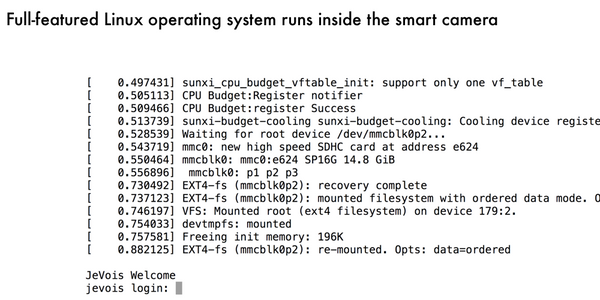Software
The JeVois software features the following components:
- All software open source (GPL)
- Full Linux operating system runs on the JeVois smart camera's quad-core processor, boots in 5 seconds
- Learn computer vision with JeVois by programming your own machine vision modules live on JeVois using Python + OpenCV 4.10
- Custom kernel modules for camera sensor & USB streaming run inside the smart camera
- Buildroot framework to easily add software packages and create microSD card image
- JeVois C++17 video capture, processing & streaming framework
- Switch machine vision modules on the fly by changing output resolution
- Download pre-programmed machine vision modules or create your own
- CMake build system
- Full cross-compiler suite (compile all software on your desktop)
- Compile and run the same software on desktop and on JeVois hardware, at the same time (very useful for development & debugging)
- Operating system and vision software all stored on microSD card, hacker-friendly and unbrickable. Smart camera can use microSD to save data.
- Included software libraries (used for the demos seen in the video):
- TensorFlow Lite deep neural networks
- Neuromorphic algorithms for visual attention & scene understanding
- OpenCV machine vision algorithms
- All opencv-contrib modules (object recognition, ArUco, etc)
- ZBar library for barcode & QRcode detection and decoding
- tiny-dnn library for deep convolutional neural networks
- GPU-accelerated image processing using OpenGL ES2.0 shaders
- Support for NEON multimedia processor instructions
- Vlfeat library for visual feature computation
- OF_DIS library for fast motion flow computation
- Eigen3, TBB, OpenMP, etc

The JeVois smart camera runs a full-featured Linux operating system directly on the quad-core processor inside the camera. You can interact with the camera over the USB link and over the serial (UART) link to change its behavior at run time. You can even start the smart camera in debug mode and log into it as you would do with any other Linux computer!
JeVois Inventor graphical front-end
Easily develop new machine vision pipelines on JeVois using full Python 3.7, numpy, scipy, and OpenCV.
Host system requirements
The JeVois smart camera can work as a standalone computer, with no USB video streaming. In such case, JeVois can simply stream commands to an Arduino or similar over its serial port. All you need then is to provide power to the JeVois camera's mini-USB connector (e.g., USB charger, USB battery bank).
For video streaming over USB: You can switch between different vision processing modes on the fly and at runtime, by selecting different camera resolutions and frame rates on your host computer. For example, 640x300@60fps may run the visual attention algorithm, while 320x256@60fps may run the QRcode detection algorithm. A configuration file on the MicroSD card establishes the mapping between USB video resolution and frame rate, camera sensor resolution and frame rate, and vision algorithm to run.
Linux (including Raspberry Pi): No drivers are needed. Use the free guvcview or other video capture software.
Windows: No drivers are needed. Use the free AMCap video capture software or free OBS Studio software on Windows to grab video.
Windows, Mac OS X: No drivers are needed. You can use the built-in Photobooth app to trigger the default JeVois intro machine vision module, but Photobooth does not allow you to change resolution and hence to trigger other JeVois modules. Use the free CamTwist software or free OBS Studio software on Mac to grab video with various resolutions, thereby running different JeVois vision modules.
Also see this documentation page for more information.
Developing for JeVois
Python & OpenCV: You can start writing your own computer vision software using Python and OpenCV immediately as soon as you plug JeVois into any host computer (Windows, Mac, Linux). Simply tell the smart camera to export its microSD card as a virtual USB flash drive, use any text editor on your host computer to write Python code and save it directly to the microSD card inside JeVois, and run it on the smart camera!
C++ & OpenCV and other machine vision libraries: For more advanced programming in C++, everything is cross-compiled on a host computer. At present only Linux is supported for compiling JeVois software. JeVois software is written in C++17, with a few low-level algorithms in optimized C. We use CMake to manage the build process. This allows you to build for both your host computer and for the JeVois hardware, both at the same time. This is very useful during development, since you can test your algorithms using any USB webcam and observe the results in a window on your screen. You can also use your host computer to train a deep neural network quickly, and then just load the weights onto your MicroSD card. The JeVois operating system is Linux and its features are managed by buildroot.
Scripts are provided to automate the process:
rebuild-host.sh - compile the entire JeVois software suite natively on a host computer. You can use it with a USB webcam, and it display outputs in a window on your screen.
rebuild-platform.sh - cross-compile the entire JeVois software suite for the smart camera hardware.
jevois-flash-card - flash the cross-compiled results from rebuild-platform.sh to a MicroSD card.
Try it for free
The JeVois software framework can be compiled and run on a standard desktop computer running the latest Ubuntu Linux 64-bit. You can download it and try it on your desktop using a regular web cam to provide video inputs. Details are at http://jevois.org.
>> Continue to machine vision software examples